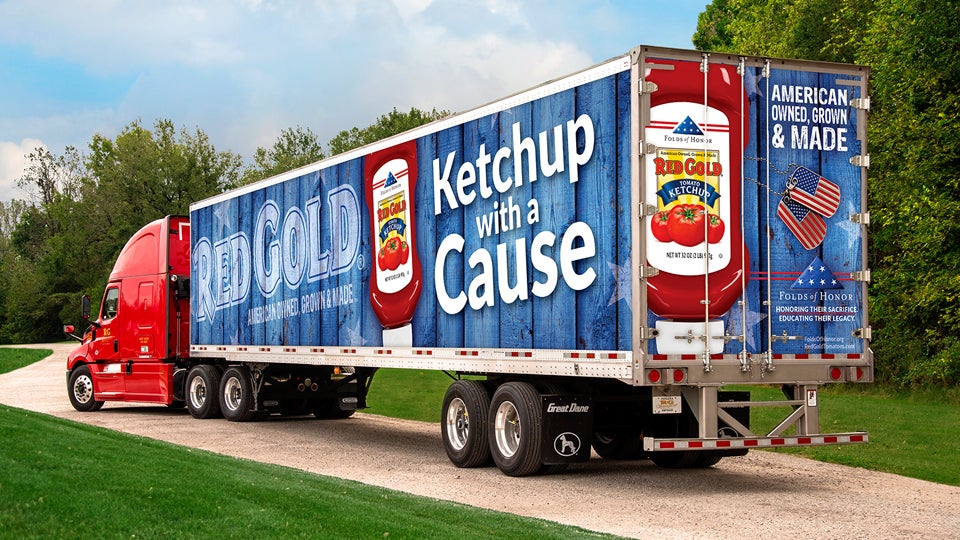Indiana tomato processor sees no let-up in demand
ELWOOD, Ind. (Inside INdiana Business) Indiana tomato processor Red Gold Inc. says consumer demand for its canned tomato products in grocery stores has seen “incredible” growth during the nine months of the pandemic as people sheltered in place. But the company says a generational change about home cooking is also a factor.
As the healthcare crisis set in, grocery stores were overwhelmed by consumers who stocked up, putting pressure on food manufacturers to increase production.
In an interview with Inside INdiana Business, Vice President of Marketing Colt Reichart said Red Gold’s response took a page from the company’s history book.
“We were also founded during chaos. Red Gold was founded by my great grandfather during World War II,” said Reichart, who represents the 4th generation of tomato processors. “We’ve always been used to reacting fast and rising to those challenges. I would say that has formed our culture, our employees are dedicated, and they’re passionate. They’re problem solvers.”
While its foodservice and institutional business slowed as dine-in restaurants and schools temporarily closed, Red Gold said production of ketchup packets and dunking cups increased as fast-food restaurants kept operating.
“You can’t make a meal out of a ketchup packet, but people still want it,” said Reichart.
But the biggest demand was felt as consumers stocked up on canned goods.
“With COVID-19, we saw a dramatic shift between channels and consumption. Consumers were buying retail canned sizes and clearing store shelves faster than the retailers themselves could stock them,” said Reichart.
He says it became more challenging to acquire cans as the supply chain felt increasing demand from other canning companies.
“The 14.5-ounce can is the most popular retail size. Those were out nationwide, the empty ones. So, we pivoted and started packing 28-ounce sizes,” said Reichart. “Retailers were willing to take whatever and so were consumers.”
The company added shifts for its production output, the distribution center, and its trucking company.
“And all three of our manufacturing plants were producing products 24 hours a day, seven days a week,” said Reichart.
Reichart says retailers have continued to push for more inventory to fill their store shelves.
“Everyone has ordered way more than you would ever imagine,” said Reichart. “Heavy consumption is going to continue, and I imagine inventory will be low for everyone.”
Earlier in November, Red Gold announced it is hiring about three dozen more workers for its newly installed, high-speed labeling line to keep up with demand not only for Red Gold products but private label brands.
“We were already going down that route before COVID, in terms of installing the new line,” said Reichart. “But it was going to be 12 months, we got it done in six.”
Fortunately, as consumer demand increased, so did tomato production. Reichart says after a tough planting season, the growing season was nearly perfect in terms of weather. He said the harvest season even went a week longer than normal due to ideal fall weather.
“Mother Nature really came through and blessed this harvest,” said Reichart.
But for a company that faces the uncertainty of weather each growing season, they must hedge their acreage forecast.
“We always plant more than we need because you never know what weather challenge you’ll face,” said Reichart. “If we get too many tomatoes, we can always make more ketchup, you don’t want to be short.”
Reichart says demand has increased not only due to the pandemic, but due to changes to consumer behavior. He says the number of cooking shows on TV and sharing of recipes on social media.
“Cooking at home, regardless of the demographics, is always been making a comeback,” said Reichart. “If anything good can come from this, it’s that more people got to spend more time with their families at home. Hopefully, they shared a meal together.”
Red Gold contracts with 40 tomato growers from Indiana, southern Michigan and northwest Ohio. Reichart says none of the tomatoes travel more than 200 miles to reach a processing plant.
